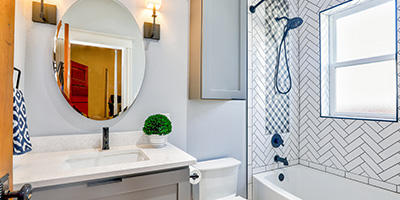Learning Bathroom Plumbing: Essential Tips for New Homeowners
Learning Bathroom Plumbing: Essential Tips for New Homeowners
Blog Article
Do you find yourself trying to find ideas around Essential DIY Bathroom Plumbing Tips Every Homeowner?

For new homeowners, understanding and maintaining washroom plumbing can conserve both time and money by avoiding expensive concerns down the line. Right here are some necessary shower room pipes tips to aid you keep everything running smoothly.
Familiarize Yourself with the Key Shut-Off Shutoff
Knowing where the main water shut-off valve is located in your house is critical. This permits you to rapidly shut off the supply of water in case of significant leaks or throughout pipes emergencies, stopping comprehensive water damages.
Frequently Evaluate for Leaks
Little leakages can result in large troubles. Routinely inspect under sinks, around bathrooms, and near pipes components for any indicators of leakages. Seek moisture, little drips, or rust. Catching and repairing leakages early can protect against much more serious damage and save water.
Don't Overlook Slow Drains
If your sink or bathtub is draining pipes slowly, it's typically an indication of a clog forming. Addressing this very early can avoid a complete blockage. Make use of a bettor or a plumber's snake to clean out particles. Stay clear of using chemical drain cleansers as they can damage your pipes gradually.
Know What Not to Flush
Commodes are not waste disposal unit. Avoid flushing anything besides bathroom tissue and human waste. Things like wipes, womanly health products, and cotton bud need to be disposed of in the garbage to avoid obstructions and drain back-ups.
Install Strainers in Drains
Area filters in your sink and bathtub drains pipes to capture hair and various other debris before they enter your pipes system. Cleaning up the filters regularly will assist avoid build-up and maintain water flowing openly.
Preserve Your Water Heater
Guarantee your water heater is readied to an appropriate temperature (normally about 120 degrees Fahrenheit) to prevent scalding and reduce energy usage. Flush the container annually to eliminate debris buildup, which can reduce the efficiency and life expectancy of your heating unit.
Upgrade Your Fixtures
If your home has older components, consider updating to much more effective designs. Modern bathrooms, showerheads, and faucets are designed to utilize much less water while supplying great stress, which can substantially reduce your water bill and ecological footprint.
Be Cautious with Do It Yourself Pipes Repair Works
While it's tempting to take care of all home repairs by yourself, be cautious with plumbing. Some concerns could call for expert experience, specifically if they entail major water lines or sewer repairs. Hiring a specialist can often be extra economical than do it yourself, specifically if it avoids additional damage.
Get Ready For Cold Weather
Safeguard your pipelines from cold throughout cold weather by protecting pipes in unheated areas like cellars, attic rooms, and garages. Throughout extreme cold, let cold water drip from faucets offered by revealed pipes to help avoid freezing.
Arrange Normal Maintenance
Take into consideration scheduling yearly assessments with a certified plumbing technician. They can find concerns that you might miss, such as hidden leakages or deterioration on pipelines and components. Normal maintenance assists extend the life of your plumbing system and can stop emergencies.
Verdict
Recognizing and maintaining your home's bathroom plumbing can avoid lots of common problems. By complying with these important suggestions, you can guarantee your restroom remains useful and reliable, saving you money and time in the future.
Essential Plumbing Tips for Homeowners: Keep Your Pipes Flowing Smoothly
As a homeowner, understanding the basics of your plumbing system can save you time, money, and a lot of headaches. Plumbing issues can range from minor annoyances like dripping faucets to major problems like burst pipes that cause significant damage. This guide provides essential tips to help you maintain your plumbing system and tackle common issues.
Understanding Your Plumbing System
Supply System: Brings fresh water into your home from a municipal source or a well. Drain-Waste-Vent System: Removes wastewater and vents sewer gases outside. Fixtures and Appliances: Includes sinks, toilets, showers, dishwashers, and washing machines. Basic Maintenance Tips
Regular Inspections: Periodically check for leaks, corrosion, and other signs of wear and tear. Look under sinks, around toilets, and near water heaters. Know Your Main Shut-Off Valve: In case of a major leak, you’ll need to shut off the water quickly. Ensure everyone in your household knows where the main shut-off valve is located. Prevent Frozen Pipes: In cold climates, insulate exposed pipes and let faucets drip during extreme cold to prevent freezing. Use Strainers: Install strainers in sinks and tubs to catch hair, food particles, and other debris that can cause clogs. Common Plumbing Issues and Solutions
Clogged Drains:
Prevention: Avoid pouring grease down the drain and use drain screens to catch debris. DIY Fix: Use a plunger or a plumbing snake to clear minor clogs. For stubborn clogs, a mixture of baking soda and vinegar can sometimes help. Leaky Faucets:
Prevention: Replace washers and seals regularly. DIY Fix: Turn off the water supply, disassemble the faucet, and replace worn parts.

Set Up An Appointment Report this page